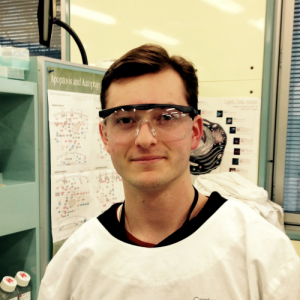
Vitamin D appears to be protective from MS, and to reduce relapse rate. The mechanism however, is currently unknown. The recent identification of a number of genes affecting MS susceptibility may provide a valuable avenue to finding out more about the role of vitamin D in MS. Nearly a third of these genes are predominantly expressed in messenger cells of the immune system known as dendritic cells. Of these, two genes are known to regulate vitamin D activity, which suggests a potential mechanism for the effects of vitamin D on MS risk.
Mr Edwards’ vacation scholarship will be in the laboratories of Associate Professor David Booth. Associate Professor Booth’s work into MS genetics has recently shown that vitamin D regulates dendritic cells by controlling whether other MS risk genes are turned on or not. In particular, a gene called ZMIZ1 is not turned on sufficiently in MS.
In Mr Edwards’ scholarship, he will be further investigating the interactions between vitamin D and expression of the ZMIZ1 gene. Over the ten week scholarship, Mr Edwards will study how gene expression in different types of cells, including dendritic cells, changes in response to different levels of Vitamin D. He will then study whether changes in gene expression are translated into functional differences in the level of mRNA or proteins produced by this gene.
This work will help to understand the effects of vitamin D supplementation on gene expression, and understanding if this may be harnessed as a potential new treatment avenue for MS.
Updated: 1 March 2016
Updated: 02 January, 2016

